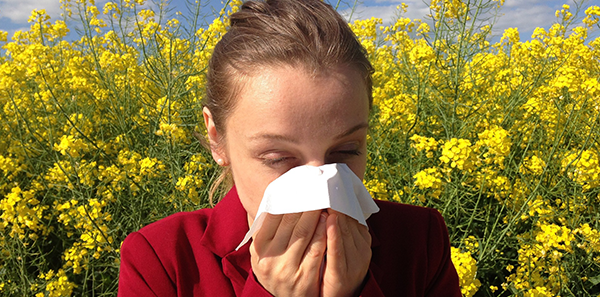
Given our medical department’s concern with preventive medicine, we wish to offer a brief overview of some of our organism’s defensive mechanisms and their relation to one of the most common pathologies of autumn and spring: ALLERGY.
An allergy is an excessive reaction provoked by our organism unto substances which it considers harmful when, in reality, they are not. An “excessive” reaction presupposes, therefore, the existence of a “normal” reaction. This normal reaction is an immunological reaction. The function of our immunological system is to defend us against all types of invasions or aggressions by strange substances. When our immunological system is excessive in its response unto some aggressions, a hypersensitive reaction also called allergy is produced.
The substance one is allergic to is called dan “allergen” and the symptoms which are provoked are known as “allergic reactions”. Our organism’s complex and sophisticated defensive mechanism produce antibodies, the body’s defenders which neutralize the intruders, called antigens. When the cells responsible for our defense, mainly lymphocytes, among other, detects allergens entering our organism, they respond by producing a series of specific, concrete, defensive elements unto these allergens, called antibodies.
When an allergen penetrates the organism of a person with allergies, the immunological system responds producing large quantities of antibodies called immunoglobulin G (lgG). An excessive exposure to the same allergen prompts the liberation of chemical mediators, particularly histamine, which produces the typical symptoms of allergies.
To sum up, an allergy is a complex phenomena of “hypersensitivity” produced as a consequence of the reaction of our defensive system-immunological system unto its exposure to a particular substance-allergen-provoking an excessive response which is manifested by specific organs depending on the place of contact or aggression, capable of developing, over time, new symptoms as well.
When our organism enters into contact with a strange substance for the first time, the immunological system learns to recognize and memorize it. “Sensitivity” means that the immunological system has been exposed to an antigen, has memorized it, and has produced specific antibodies with which to attack it. Upon subsequent contacts, the immunological system recognizes the antigen and immediately reacts against it.
The most common allergens are pollen, dust mites, domestic pets, fungi, food, medications and insect bites.
An allergic reaction may be manifested in various ways, on different parts of the body and to a greater or lesser degree. The organs which respond are, basically, the skin and both the respiratory and digestive systems. Some allergies are evident year round, like the allergy to dust, animals, medications or food. Other allergies appear only during specific times of the year, a typical example being allergic to pollen or hay fever.
During springtime occur the most frequent pollination phenomena, and persons with defective defensive mechanisms in their immunological system Will produce hypersensitive reactions known as allergic reactions, with the appearance of typical symptoms like sneezing, redness and itching of the nose and eyes, tearing and nasal congestion. These symptoms, also known as seasonal allergic rhinitis, must not be confused with the symptoms of a common cold.
Treatment against allergies is based on three basic principles:
-The first one consist of AVOIDANCE of the offending allergen, once it has been diagnosed. This is very difficult at times, as in the case of domestic dust or allergens which produce symptoms upon entering into contact with them…
-The second measure is called DESENSITISATION (hyposensitization), based on the periodical injection of increasing doses of the allergen so that the person can produce antibodies against it. These are known as VACCINES. It is long-term treatment, lasting approximately 3 years.
-Thirdly, is treatment with MEDICATION, the so-called ANTIHISTAMINES. These are used, special, against allergic rhinitis and in allergic dermatitis (atopic eczema). This use of medication requires follow-up due to the possibility of side effect, and can only be prescribed by medical professionals.
This short summary unifies some of the most striking and simple aspects of the phenomena related with hypersensitivity, also known as allergy.
Dr. Juan Antonio Andreo-ASSSA Medical Director.
The information published in this media neither substitutes nor complements in any way the direct supervision of a doctor, his diagnosis or the treatment that he may prescribe. It should also not be used for self-diagnosis.
The exclusive responsibility for the use of this service lies with the reader.
ASSSA advises you to always consult your doctor about any issue concerning your health.












